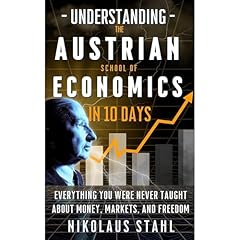
The Essential Austrian Economics
Essential Scholars
No se pudo agregar al carrito
Add to Cart failed.
Error al Agregar a Lista de Deseos.
Error al eliminar de la lista de deseos.
Error al añadir a tu biblioteca
Error al seguir el podcast
Error al dejar de seguir el podcast
 Exclusivo para miembros Prime: ¿Nuevo en Audible? Obtén 2 audiolibros gratis con tu prueba.
Exclusivo para miembros Prime: ¿Nuevo en Audible? Obtén 2 audiolibros gratis con tu prueba.Compra ahora por $12.28
-
Narrado por:
-
Charity Spencer
The origin of the Austrian School of economics is the publication of Carl Menger’s Principles of Economics in 1871. Menger, William Stanley Jevons, and Léon Walras are considered the co-founders of the “marginal revolution” in economics, a shift to the marginal utility theory of value from the labour theory of value. The revolutionists argued that value is not based on the amount of labour expended, but reflects how useful people perceive the commodity to be in satisfying their ends.
This revolution had radical implications for the way economists understood the world: consumer valuations, and not the amount of effort, is what determines prices. But what determines consumer valuations? This question had long perplexed social scientists. Why do consumers value diamonds, a luxury item, more than water, an essential for life? By introducing the concept of marginal utility, Menger and his co-revolutionaries were able to resolve this paradox.
The labour theory of value, however, was not Menger’s only target in his principles. He was also engaging the German Historical School, which held that economic science is incapable of producing universal principles. In contrast, Menger, using marginal utility analysis as a foundation, argued that universal economic laws do apply across time and geographic space. Those in the German Historical School took issue with the claims by Menger and his colleagues about the possibility of universal theory and labeled them the “Austrian School” because they taught at the University of Vienna.
Subsequent generations of scholars have developed the insights of the Austrian School. The purpose of this audiobook is to present an overview of the key tenets of Austrian economics by synthesizing the insights from these thinkers in a set of eight topics that capture the core elements of Austrian economics.
Los oyentes también disfrutaron:




















Las personas que vieron esto también vieron:



